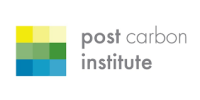About Post carbon institute
Post Carbon Institute: Leading the Transition to a More Resilient, Sustainable, and Equitable World
Post Carbon Institute is a non-profit organization that is dedicated to leading the transition towards a more resilient, sustainable, and equitable world. The institute was founded in 2003 with the aim of providing individuals and communities with the knowledge and tools they need to build a more sustainable future.
The Post Carbon Institute recognizes that our current way of life is unsustainable. We are consuming resources at an alarming rate, polluting our environment, and contributing to climate change. The institute believes that we need to fundamentally change our relationship with the planet if we are going to create a better future for ourselves and future generations.
To achieve this goal, Post Carbon Institute focuses on three key areas: education, research, and advocacy. Through its educational programs, the institute provides individuals with the knowledge they need to make informed decisions about their lives. Its research programs help identify solutions for creating a more sustainable world while its advocacy efforts work towards creating policies that support these solutions.
One of Post Carbon Institute's most significant achievements has been its work on peak oil awareness. The institute was one of the first organizations in North America to recognize that oil production would eventually peak and begin declining. This realization led them to focus on developing strategies for transitioning away from fossil fuels towards renewable energy sources.
Today, Post Carbon Institute continues this work by promoting community resilience as an essential component of sustainability planning. They believe that building strong local communities is critical for ensuring long-term sustainability in an increasingly uncertain world.
The institute's approach is based on four key principles:
1) Reduce consumption: By reducing our consumption levels through lifestyle changes such as using public transportation or eating locally grown food can significantly reduce our carbon footprint.
2) Increase efficiency: By increasing efficiency in all aspects of life from transportation systems like electric cars or public transportations can help us reduce emissions.
3) Shift toward renewable energy sources: Shifting away from fossil fuels toward renewable energy sources like solar power or wind power will help us reduce greenhouse gas emissions.
4) Build community resilience: Building strong local communities will help us adapt better when faced with challenges such as natural disasters or economic downturns.
Post Carbon Institute's educational programs include online courses designed for individuals who want to learn about sustainability issues at their own pace; workshops designed for groups interested in learning about specific topics related to sustainability; webinars featuring experts discussing various aspects of sustainability; books written by leading experts in their fields; podcasts featuring interviews with thought leaders working towards creating a more sustainable future.
In addition to its educational programs, Post Carbon Institute also conducts research into various aspects of sustainability planning. Their research focuses on identifying best practices for building resilient communities while also exploring new technologies that could be used in transitioning away from fossil fuels towards renewable energy sources.
Finally, Post Carbon Institute advocates for policies at all levels (local/state/national/international) aimed at promoting sustainability planning initiatives such as reducing carbon emissions through clean energy investments or supporting local food systems through urban agriculture projects etc.,
In conclusion,
Post Carbon Institute has been instrumental in raising awareness about peak oil production decline while advocating policies aimed at promoting community resilience as part of broader efforts aimed at achieving long-term environmental stability worldwide!
